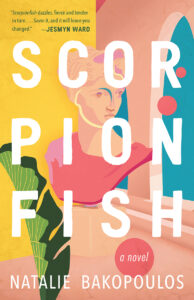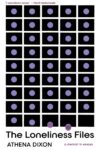
[Tin House; 2020]
Eight years ago Natalie Bakopoulos published her debut novel, The Green Shore, telling the story of a family living through the Greek military Junta of the late sixties. Her follow up, Scorpionfish, published earlier this year by Tin House, stays within Greece but sees her attention turn to contemporary Athens. Bakopoulos has said previously, “nostalgia as a literary or artistic preoccupation can be too simplistic, boring.” In Scorpionfish, Greece is, accordingly, not depicted purely in terms of its culture or history, or as a holidaymaker’s paradise. Instead, the reader is witness to a ravaged country, devastated by financial collapse and struggling to cope with a growing refugee crisis. Athens is a city where one home “seemed like it had burned in a fire, and the next was fit for a magazine photo-shoot.” Bakopoulos paints Greece with a Janus face allowing the reader to see both sides — its blemishes and its beauty.
The novel follows Mira, a Greek American academic who arrives in Athens following her parents’ funeral a few months earlier. She spends her days within her apartment, haunted and amused by memories of her Greek childhood. This is where she grew up before emigrating to the States as a child. She moves from room to room, “as if I could walk through walls.” In the evenings she talks to her neighbor on the adjoining balcony, a seaman known as The Captain. Separated by opaque glass, they reminisce, speaking to themselves as much as each other. “Our stories entwined like a double helix,” says Mira. “I could feel him listening, as if he’s been listening to me for years.” The separation suits Mira and The Captain — it allows them to speak honestly, as if to themselves. By being in each other’s company and not, at the same time, they maintain a degree of insularity that both seem to cherish. For the captain, too, is suffering. The son of a famous left wing Greek politician, his name is known throughout Athens, but he prefers anonymity; his marriage is over but their twin daughters are yet to be told; and he has lost his job as a sea captain. “The balcony allowed us to be two things, to occupy two places, at once,” he says. “It was a limbo, but one in which I strangely felt whole in the split.” Scorpionfish’s narrative voice drifts between the Captain and Mira as they build a relationship, spending evenings on the balcony. Bakapoulos’ prose has a detached clarity that makes room for emotion and feeling. Like a surgeon performing on their own heart, she is beautifully precise yet unafraid to reveal all in her storytelling.
Near the beginning, we are introduced to Mira’s oldest friend, Nefeli, a renowned artist. Nefeli is older, in her sixties, with a new art exhibition opening soon, a large installation exploring notions of surveillance and protest. Like many of the older characters, her memories of a right wing military occupation are still sharp. Nefeli’s behavior is erratic, she disappears suddenly and often which worries Mira and her friends: Fady, a violin maker and Arabic interpreter, and his wife Dimitria, a journalist and singer. As the story develops, the reader learns that Nefeli is the link to Mira’s past — she was her Aunt’s lover and imprisoned on an island as a teenager during the military Junta — whereas Fady and Dimitria root Mira in the present. They run a school for refugees in which one boy in particular, a teenager, Rami, forms a close relationship with Mira for she, too, understands the difficulty Rami will face throughout his life having to learn to exchange one culture for another — “My mother existed in two places but lived nowhere.”
Through layers of Mira’s relationships and the interactions she has with her friends – in the streets, beaches and tavernas of Athens — the reader witnesses a fractured country struggling to reinvent itself and find a new identity. Fascist young men block the street when Mira is walking with Rami. Crisis tourists are disappointed not to see more visible scarring of the ancient city. Walls are daubed with anti-capitalist graffiti. There is poverty and gentrification, homelessness and airbnbs. Mira and her friends drink and eat in the same tavernas they have known of since they were young; they order baked chickpeas, keftedakia, dakos salad, and sing songs by Kazantzidis. The familiarity of food and music resonates with their upbringing — their pride in celebrating traditional Greek culture. But the recent success of far right political party Golden Dawn, following the economic crisis, has given voice to anti-immigrant, nationalistic feeling. From shaven headed young men in the street to taxi drivers and shopkeepers, xenophobic attitudes — abhorrent to Mira and her friends — pervade the city, reversing their pride, turning it to shame.
As the heat of summer arrives, Mira travels to her parents’ house on the Island. It brings back memories of childhood and friendship. “To return to a place again and again is to confront the sneaky passing of time,” she says. “What of those earlier selves is left in me?”
She reflects on her mother’s struggle to adapt to a new life abroad, her alcoholism and depression unseen by Mira at the time now appear obvious as she recounts their time together; her past being rewritten by memory, whilst her present life is uprooted further still. Her long term, long distance relationship with an up-and-coming Greek politician ends in dramatic fashion. He is engaged to somebody else and his new fiancee is pregnant with his child. Mira’s spiraling grief starts to weigh heavily; she disconnects from herself. One day, breathlessly clambering to shore, having swum dangerously far out to sea, she is confronted by concerned locals. Mira cannot speak. It is as if she no longer knows who she is. The rhythm of her strokes, her steady, patterned breathing, creates a fugue-like state in Mira. “Maybe I had somehow finally split myself in two: the woman I was then and the woman I was becoming, both of us out there carving through the waves.”
Shortly before her death, Mira’s mother went swimming in the same sea and was bitten by a scorpionfish. The resulting medical treatment revealed her cirrhotic liver from years of alcohol abuse. But scorpionfish is not only a venomous creature found in the Aegean sea; it is also a popular ingredient of Greek cuisine, used mostly in soup and pasta dishes. This type of duality (the deadly and the delicious) is present throughout the novel. It is a novel about people and place. Mira’s academic field of study is ethnography. She understands the relevance of customs and culture and how they can influence the individual. In many ways Scorpionfish is an ethnographic novel, with Mira as the subject.
Bakopoulos’ writing manages to be both intimate and amplified, she excels at creating inner worlds whilst simultaneously examining the wider society they inhabit. By granting us access to Mira and the Captain, Bakopoulos reveals broader truths about the immigrant experience, political power, art, history, childhood, the city and the sea. Scorpionfish invites us to hold Bakopoulos’s stare as she peels the layers off Greek society through her characters, but never because of them. The elegant, direct prose style is so stripped of artifice the reader becomes fixed in the storytelling — there is simply no option to turn away. Nor is there any need to get distracted by contrived plot lines or decorative excess. Despite being rich in detail, Scorpionfish is also bare and essential in its message. Like all good books, it doesn’t seek answers but knows how to ask all the right questions.
Simon Lowe is a British writer and journalist. His stories have appeared in Breakwater Review, AMP, Storgy, Firewords, Ponder review, and elsewhere. He has written articles about books and society for the Guardian and BBC worldwide. His new novel, The World is at War, Again, will be published in 2021 (Elsewhen Press).
This post may contain affiliate links.







